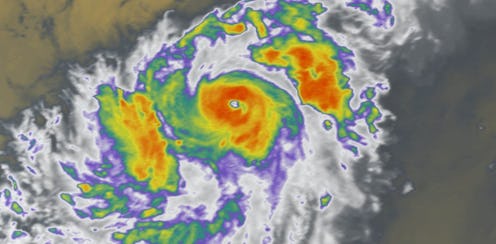Hurricane season is out in full force with Hurricane Harvey causing mass-scale displacement for locals, power outages, and much more distress in Southeastern Texas. Now, another potential disaster may be headed toward the East Coast and Gulf Coast of the United States. According to weather forecasts, Hurricane Irma went from a tropical storm on Thursday morning to a Category 3 hurricane within 30 hours. At this moment in the forecast models, sobering predictions from both America and Europe show that Hurricane Irma might hit Florida but it's too early to say for sure.
Irma's development has been a source of concern for meteorologists. The hurricane that began as a tropical storm on Thursday morning underwent "rapid intensification" and became a Category 3 hurricane packing winds at 115 mph. According to European predictive models, the vicious hurricane may head toward South Florida if its winds push it south. This would affect areas in Florida as well as parts of the Gulf of Mexico.
Jeff Weber, a meteorologist for the University Corporation for Atmospheric Research in Colorado, spoke of Irma's present movement. "Quite frankly, [Irma] is currently a little south, which is generally what would make us fearful for storms going into the Caribbean and the Gulf," Weber told NOLA.com.
Right now, the kind of trajectory that Irma could take is contingent on its placement over the Atlantic Ocean. Winds over the ocean could either push Irma toward the Bahamas or they may pull it up the northwest coast. But its track isn't confirmed yet. In order to gain a better understanding of the potential path of the hurricane, the National Oceanic and Atmospheric Administration will run its hurricane detecting aircraft near Irma and use the data from the aircraft to delineate a clearer track for the monstrous storm.
So for now, Americans in the potential pathway of Hurricane Irma should stay calm, according to meteorologists. Ideally, the hurricane will go back to the ocean without ever touching the American coastlines or mainland.
In the case that Hurricane Irma does gain more strength and head toward the United States, weather forecasters have advised to prepare in advance and not panic. Echoing the same sentiment behind remaining level-headed and prudent in the time of chaos, meteorologist Philip Klotzbach told USA Today, "The forecast cone is several hundred miles wide, so we’ll all be watching, waiting and being prepared. We don't want the entire coastline from Florida to Maine to freak out, but pay attention."
